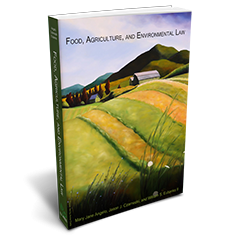
In the groundbreaking Food, Agriculture, and Environmental Law leading environmental legal scholars Mary Jane Angelo, Jason Czarnezki, and Bill Eubanks, along with five distinguished contributing authors, undertake an exploration of the challenging political and societal issues facing agricultural policy and modern food systems through the lens of environmental protection laws. Through this exploration, the authors seek to answer difficult questions about the need for new approaches to agricultural policy and environmental law to meet 21st Century concerns surrounding:
- Climate change
- Sustainable agriculture
- Accessibility to healthy foods
- Conservation of natural resources and ecosystem services
This is the first book to examine both the impact of agricultural policy on the environment and the influence of environmental law on food and agriculture. The authors present a brief historical overview of agricultural policy as it has adapted to satisfy shifting demands and new technologies, and its role in shaping not only the current farming system and the rural economy, but also the value which we ascribe to our natural resources relative to agricultural production. The authors:
- Explain in detail the components of the current farm bill
- Analyze the ecological impacts of the modern farming system encouraged by our nation's agricultural policy
- Examine the interplay between agriculture, food production and distribution, and existing environmental and related laws
- Conclude with several concrete proposals to reform agricultural policy that serve as models of how to enhance sustainability in our farming and food system
This book supplies a comprehensive, timely, and cohesive guide on the intersection of agriculture and the natural environment. It achieves this goal through an interdisciplinary lens, engaging diverse perspectives to provide both a practical and academic examination of the environmental impacts of current farm policy, the applicability of environmental regulatory mechanisms to agriculture and food, and reform proposals to combat environmental harms while protecting farmers' economic interests as well as the rural communities they bolster. As a result, this work serves as the quintessential text for bringing these issues to the classroom in a variety of fields, including law, public policy, agricultural economics, and environmental science.
“This book is an essential guide for changing the direction and dynamics of a food production system in deep peril. The good news is that we already have a complex structure of policies, laws, and regulations in place that, if properly applied, could help us right the course of American agriculture. Food, Agriculture, and Environmental Law may be just the book to inspire a new generation of policymakers, activists, and lawyers to rebuild a food system around the principles of environmental sustainability, social equity, and rural vitality.”
- Daniel Imhoff, Distinguished Author (Food Fight: The Citizen’s Guide to the Next Food and Farm Bill and Farming with the Wild: Enhancing Biodiversity on Farms and Ranches) and Director at Watershed Media
“This groundbreaking book has arrived in the nick of time to provide a carefully crafted blueprint for what must be done to reform our food and agricultural systems through existing laws and policies. A must read for anyone who enjoys healthy food produced in an ecologically sustainable manner, this book provides a ray of hope in a darkening landscape.”
- Patrick A. Parenteau, Professor of Law and Senior Counsel to the Environmental and Natural Resources Law Clinic, Vermont Law School